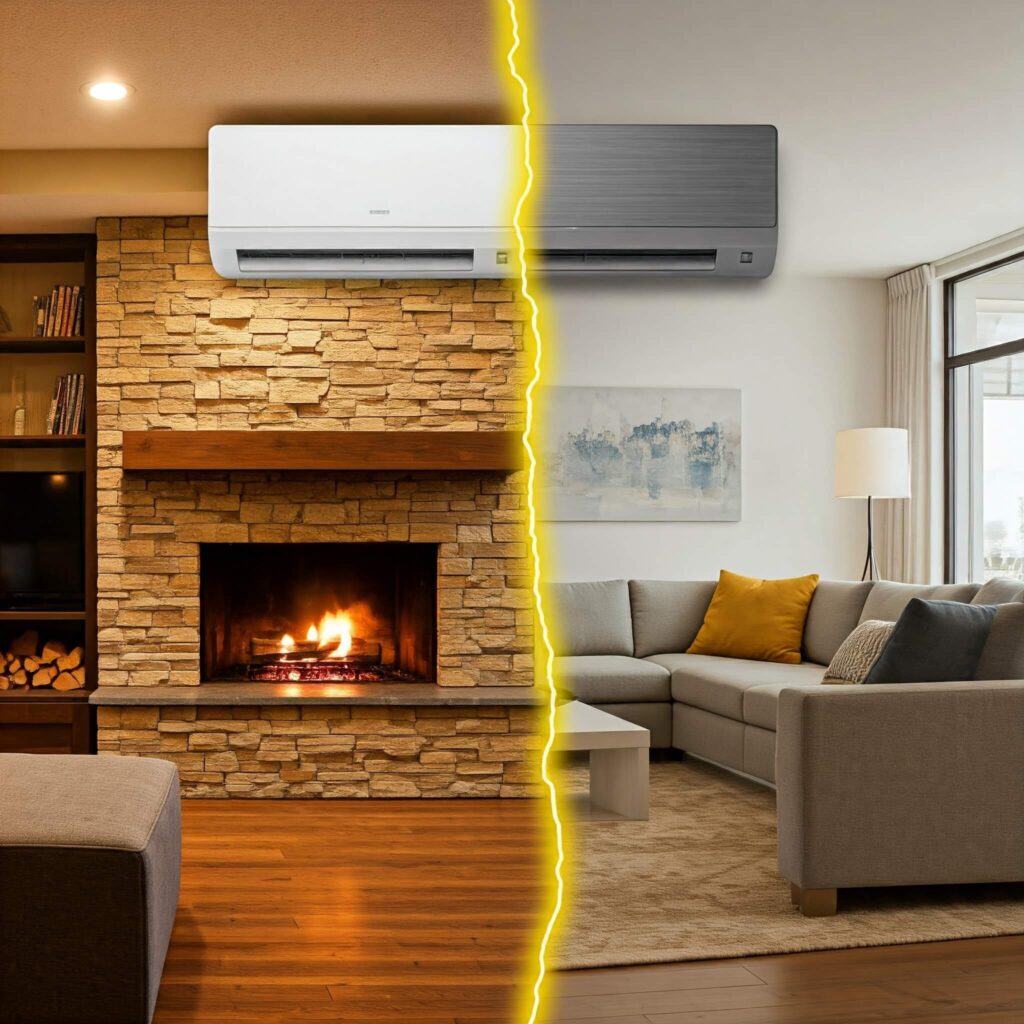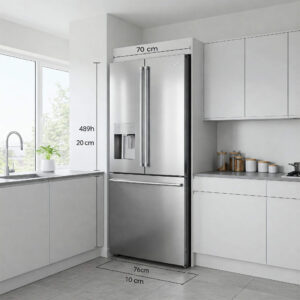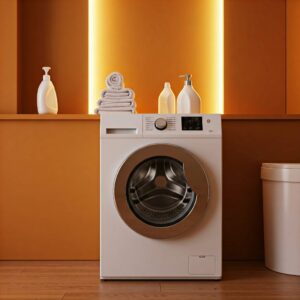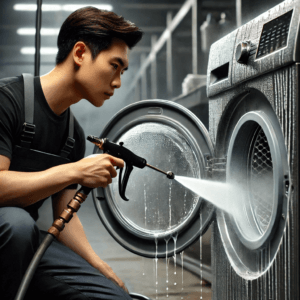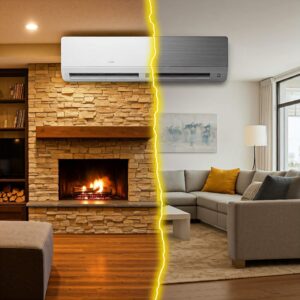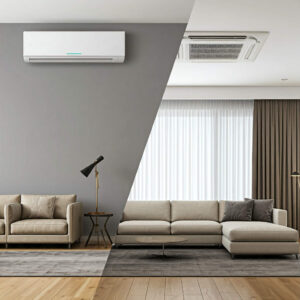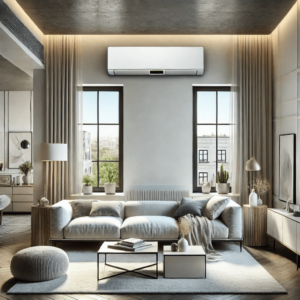Choosing between an inverter and a non-inverter air conditioner can feel like a big decision, especially when you consider the impact on your comfort, electricity bills, and long-term maintenance. Let’s break down what makes these types different, the benefits and drawbacks of each, and, most importantly, which one might be the better fit for your home and lifestyle.
- Understanding Inverter and Non-Inverter Air Conditioners
- Key Differences: Inverter vs. Non-Inverter Air Conditioners
- Choosing Based on Usage: Which Type is Best for You?
- Summing Up: Inverter or Non-Inverter?
- Conclusion
Understanding Inverter and Non-Inverter Air Conditioners
To make an informed choice, let’s clarify what we mean by “inverter” and “non-inverter” air conditioners:
Non-Inverter Air Conditioners: These operate on a fixed-speed compressor. When you switch it on, the compressor works at maximum capacity until the room reaches the desired temperature. Then, it turns off and on again as needed, which creates a bit of a temperature swing and generally uses more energy due to the repeated start-stop cycle.
Inverter Air Conditioners: These use a variable-speed compressor motor, which means the compressor doesn’t always work at full capacity. Instead, it adjusts based on the cooling needs of the room, running at a lower speed when the desired temperature is reached. This flexibility leads to greater efficiency and a more consistent temperature.
Key Differences: Inverter vs. Non-Inverter Air Conditioners
Now that we know what sets these two apart, let’s dive deeper into some key factors that differentiate them.
Energy Efficiency and Electricity Bills
Inverter AC: The main reason people are drawn to inverter models is their energy efficiency. Because they don’t constantly switch on and off, they consume less power, especially during prolonged use. The gradual, adjusted operation reduces electricity consumption by around 30-50% compared to non-inverter units. So, if you’re concerned about energy costs, an inverter AC is usually the better choice.
Non-Inverter AC: Non-inverter ACs run at maximum power each time they start, which means they typically consume more energy. If you use your air conditioner only occasionally or for short periods, the difference might not be significant. However, over time, these costs can add up, especially in hotter climates.
Comfort and Temperature Control
Inverter AC: One of the standout features of inverter air conditioners is their ability to maintain a consistent room temperature. By adjusting the compressor speed, the AC can avoid drastic changes in temperature, keeping you comfortable without the “too cold, then too warm” cycle.
Non-Inverter AC: Non-inverter ACs lack this fine-tuned control, meaning they might make your room chilly quickly but then shut off until the temperature rises again. This can lead to uneven temperatures, which may be less comfortable, especially if you’re sensitive to sudden temperature changes.
Initial Cost vs. Long-Term Savings
Inverter AC: Inverter air conditioners tend to cost more upfront due to the advanced technology they use. However, the energy savings over time can offset this initial expense. If you plan on using your air conditioner regularly and keeping it for several years, an inverter model can ultimately save you money.
Non-Inverter AC: These models are generally more budget-friendly at the point of purchase, making them appealing if you’re trying to save on upfront costs. But consider the potential for higher electricity bills in the long run—these costs could surpass the initial savings over time.
Noise Levels
Inverter AC: Because inverter air conditioners operate at variable speeds and can run on low power when maintaining temperature, they’re typically quieter than their non-inverter counterparts. If you’re sensitive to noise, especially at night, an inverter AC could be a better choice for a quieter, more peaceful environment.
Non-Inverter AC: Non-inverter models often produce more noise since they work at full power, then turn off and on repeatedly. If the AC is placed in a bedroom or study, this noise may become a bit distracting or disruptive.
Durability and Maintenance
Inverter AC: The smooth operation of an inverter AC can mean less wear and tear on the compressor. Without the constant start-stop cycle, the parts experience less strain, which could translate to a longer lifespan with regular maintenance. However, repair costs may be slightly higher due to the complex technology involved.
Non-Inverter AC: Non-inverter units are generally simpler in design, which might mean fewer parts that can go wrong. This can sometimes make them easier and cheaper to repair. However, the constant turning on and off can wear out the compressor faster, potentially reducing its lifespan compared to an inverter model.
Choosing Based on Usage: Which Type is Best for You?
Let’s go through some typical usage scenarios to help determine which AC type might best suit your needs.
If You’re Planning for the Long-Term
Investing in an air conditioner can be a long-term decision, especially in a hot climate where it might get year-round use. If you’re looking to buy an AC that will last and be cost-effective in the long run, go with an inverter model. Even with the higher upfront cost, it can pay off in energy savings and comfort over the years.
If You Use Your AC Frequently or for Long Periods
If you tend to leave your air conditioner on for extended periods, especially during the day and night, an inverter AC is usually the smarter choice. The energy efficiency, quieter operation, and stable temperatures make it ideal for continuous use, saving you money over time.
If You Only Use Your AC Occasionally or Have a Tight Budget
For occasional use—like cooling down your room for a few hours in the evening—a non-inverter AC might be sufficient. You’ll save on the initial purchase cost, and since you’re not using it heavily, the higher energy consumption won’t affect you as much. This is also a good option if you’re looking to keep initial costs down.
If You Need Cooling in a Small or Personal Space
For smaller rooms or individual areas, both inverter and non-inverter ACs can work well. But if you prefer quiet operation and consistent cooling, the inverter model can still be worthwhile for a smaller area, especially if it’s a bedroom or a study.
Summing Up: Inverter or Non-Inverter?
To wrap it up, let’s take a quick look at the pros and cons:
- Inverter Air Conditioner
- Pros: Energy-efficient, quiet, consistent temperature control, longer lifespan.
- Cons: Higher upfront cost, potentially more expensive repairs.
- Non-Inverter Air Conditioner
- Pros: Lower initial cost, simpler design, easy to repair.
- Cons: Higher energy consumption, louder, less consistent temperature, potentially shorter lifespan.
Ultimately, the choice comes down to your budget, usage, and personal preferences. If comfort, energy savings, and long-term value are important, an inverter AC is usually worth the investment. However, if you’re looking to save on initial costs and only need an AC occasionally, a non-inverter model could work just fine.
Conclusion
Before you decide, consider also checking the unit’s British Thermal Units (BTU) to ensure it matches the size of your space, as this affects cooling efficiency. Don’t know what is BTU and how to calculate it? Fret not as we have a free calculator just for you! No matter which type you choose, remember that regular maintenance is key to getting the best performance and longevity out of any air conditioner.
So, the next time you find yourself asking, “Inverter or non-inverter air conditioner: which to buy?” think about how you plan to use it, your comfort needs, and your budget. With a little consideration, you’ll be well on your way to a cooler, more comfortable space!
For more buying guides, read our blogs here.
You May Also Like
- How to Choose the Right Refrigerator Size for Your Home?
- Why Is My Washing Machine Not Draining Water?
- Why You Should Deep Clean Your Washer Dryer Once a Year?
- Inverter or Non-Inverter Air Conditioner: Which To Buy?
- What is the Right Air Conditioner Horsepower for Your Home?
- 5 Tips to Buy an Air Conditioner in Malaysia

